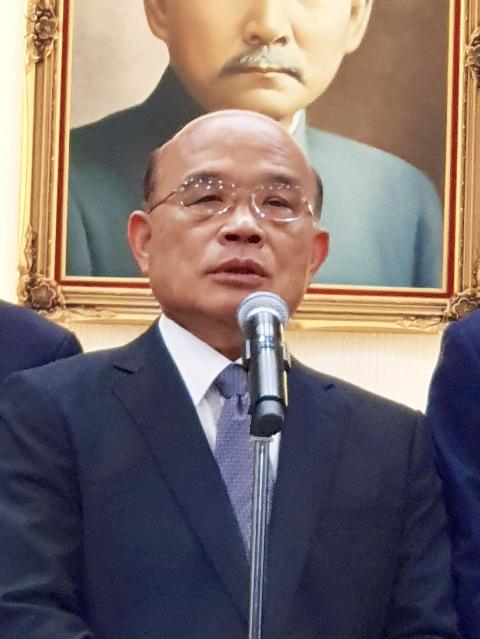The Executive Yuan today is expected to approve draft amendments to the Foreign Trade Act (貿易法) aimed at preventing companies from shipping China-made products to Taiwan to receive a “Made in Taiwan” (MIT) certificate of origin, an anonymous source said.
The amendments were published last month by the Bureau of Foreign Trade amid an ongoing US-China trade dispute.
To evade US tariffs on Chinese goods, a number of products from China destined for the US have been found making stopovers in Taiwan to gain an MIT label to conceal their source, the Ministry of Economic Affairs said last month.

Photo: Lee Hsin-fang, Taipei Times
Under the amendments, firms found guilty of illegally exporting “strategic high-tech goods” to non-restricted regions, applying and using false certificates of origin, illegally transferring goods, labeling false countries of origin or disturbing trade through undue means would face a fine of NT$60,000 to NT$3 million (US$1,929 to US$96,432), up from NT$30,000 to NT$300,000.
The amendments would also introduce a system to reward people who report breaches, which would prevent false labels from prompting foreign inspections of Taiwanese firms, and affecting the overall interests and reputation of domestic industries, the source said.
The act has not been amended in 10 years, they added.
Domestic businesses have said that the current fines are not high enough to prevent firms from illegally changing their products’ country of origin, they said.
The bureau last year began requiring stricter management of certain goods, including solar power products, bicycles, and metal screws and nuts.
It previously found that solar photovoltaic products made in China and exported to Taiwan had been labeled as being from Vietnam, the source said, adding that it now requires to see certificates of origin when goods are imported to Taiwan.
The bureau has also established a monitoring system for bicycle parts, about which domestic businesses have expressed concern, they said.
If the prices of the imports are too low, the bureau would look into the matter through the industry’s association and customs, they added.
Since last year, the bureau has been cooperating with customs to remind businesses that goods on which the US has raised tariffs need to fulfill the MIT requirements to receive an MIT certificate of origin, they said.
To receive a certificate, the goods would need to have increased in value by 35 percent from when they were imported to when they were processed and exported, they added.

INVESTIGATION: The case is the latest instance of a DPP figure being implicated in an espionage network accused of allegedly leaking information to Chinese intelligence Democratic Progressive Party (DPP) member Ho Jen-chieh (何仁傑) was detained and held incommunicado yesterday on suspicion of spying for China during his tenure as assistant to then-minister of foreign affairs Joseph Wu (吳釗燮). The Taipei District Prosecutors’ Office said Ho was implicated during its investigation into alleged spying activities by former Presidential Office consultant Wu Shang-yu (吳尚雨). Prosecutors said there is reason to believe Ho breached the National Security Act (國家安全法) by leaking classified Ministry of Foreign Affairs information to Chinese intelligence. Following interrogation, prosecutors petitioned the Taipei District Court to detain Ho, citing concerns over potential collusion or tampering of evidence. The

‘FORM OF PROTEST’: The German Institute Taipei said it was ‘shocked’ to see Nazi symbolism used in connection with political aims as it condemned the incident Sung Chien-liang (宋建樑), who led efforts to recall Democratic Progressive Party (DPP) Legislator Lee Kun-cheng (李坤城), was released on bail of NT$80,000 yesterday amid an outcry over a Nazi armband he wore to questioning the night before. Sung arrived at the New Taipei City District Prosecutors’ Office for questioning in a recall petition forgery case on Tuesday night wearing a red armband bearing a swastika, carrying a copy of Adolf Hitler’s Mein Kampf and giving a Nazi salute. Sung left the building at 1:15am without the armband and apparently covering the book with a coat. This is a serious international scandal and Chinese

Seventy percent of middle and elementary schools now conduct English classes entirely in English, the Ministry of Education said, as it encourages schools nationwide to adopt this practice Minister of Education (MOE) Cheng Ying-yao (鄭英耀) is scheduled to present a report on the government’s bilingual education policy to the Legislative Yuan’s Education and Culture Committee today. The report would outline strategies aimed at expanding access to education, reducing regional disparities and improving talent cultivation. Implementation of bilingual education policies has varied across local governments, occasionally drawing public criticism. For example, some schools have required teachers of non-English subjects to pass English proficiency

TRADE: The premier pledged safeguards on ‘Made in Taiwan’ labeling, anti-dumping measures and stricter export controls to strengthen its position in trade talks Products labeled “made in Taiwan” must be genuinely made in Taiwan, Premier Cho Jung-tai (卓榮泰) said yesterday, vowing to enforce strict safeguards against “origin laundering” and initiate anti-dumping investigations to prevent China dumping its products in Taiwan. Cho made the remarks in a discussion session with representatives from industries in Kaohsiung. In response to the US government’s recent announcement of “reciprocal” tariffs on its trading partners, President William Lai (賴清德) and Cho last week began a series of consultations with industry leaders nationwide to gather feedback and address concerns. Taiwanese and US officials held a videoconference on Friday evening to discuss the